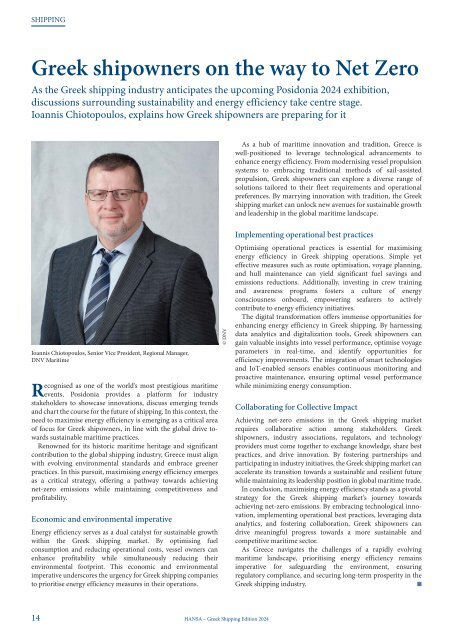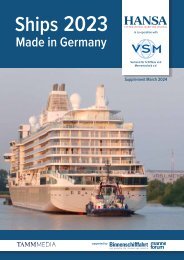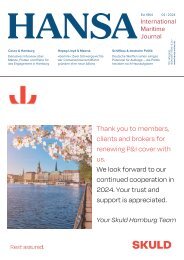HANSA Greek Shipping 2024 Posidonia Edition
SHIPPING: Greece in numbers / Interview Theodore Vokos, Managing Director, Posidonia Exhibitions / Interview Elias Kariambas, Vice President, Regional Business Development, Greece / Interview Michael Suhr, Senior Vice President and Regional Director North Europe at Korean Register (KR) / Greek shipowners on the way to Net Zero / Greek company’s strong in Capesize sector / Personal support as a USP SHIPBUILDING: Welcome to Posidonia 2024 / Setting sail for success in Greek market / Interview Jörg Karthaus, Head of Sales, Pleiger Maschinenbau / A data driven crystal ball / LNG fuelled LCO2 carriers: going for growth / 75 years of MMG Propeller – an eventful success story / Interview Lars Greitsch, CEO at Mecklenburger Metallgus (MMG)
SHIPPING: Greece in numbers / Interview Theodore Vokos, Managing Director, Posidonia Exhibitions / Interview Elias Kariambas, Vice President,
Regional Business Development, Greece / Interview Michael Suhr, Senior Vice President and Regional Director North Europe at Korean Register (KR) / Greek shipowners on the way to Net Zero / Greek company’s strong in Capesize sector / Personal support as a USP
SHIPBUILDING: Welcome to Posidonia 2024 / Setting sail for success in Greek market / Interview Jörg Karthaus, Head of Sales, Pleiger Maschinenbau / A data driven crystal ball / LNG fuelled LCO2 carriers: going for growth / 75 years of MMG Propeller – an eventful success story / Interview Lars Greitsch, CEO at Mecklenburger Metallgus (MMG)
Create successful ePaper yourself
Turn your PDF publications into a flip-book with our unique Google optimized e-Paper software.
SHIPPING<br />
<strong>Greek</strong> shipowners on the way to Net Zero<br />
As the <strong>Greek</strong> shipping industry anticipates the upcoming <strong>Posidonia</strong> <strong>2024</strong> exhibition,<br />
discussions surrounding sustainability and energy efficiency take centre stage.<br />
Ioannis Chiotopoulos, explains how <strong>Greek</strong> shipowners are preparing for it<br />
As a hub of maritime innovation and tradition, Greece is<br />
well-positioned to leverage technological advancements to<br />
enhance energy efficiency. From modernising vessel propulsion<br />
systems to embracing traditional methods of sail-assisted<br />
propulsion, <strong>Greek</strong> shipowners can explore a diverse range of<br />
solutions tailored to their fleet requirements and operational<br />
preferences. By marrying innovation with tradition, the <strong>Greek</strong><br />
shipping market can unlock new avenues for sustainable growth<br />
and leadership in the global maritime landscape.<br />
Ioannis Chiotopoulos, Senior Vice President, Regional Manager,<br />
DNV Maritime<br />
ecognised as one of the world‘s most prestigious maritime<br />
Revents, <strong>Posidonia</strong> provides a platform for industry<br />
stakeholders to showcase innovations, discuss emerging trends<br />
and chart the course for the future of shipping. In this context, the<br />
need to maximise energy efficiency is emerging as a critical area<br />
of focus for <strong>Greek</strong> shipowners, in line with the global drive towards<br />
sustainable maritime practices.<br />
Renowned for its historic maritime heritage and significant<br />
contribution to the global shipping industry, Greece must align<br />
with evolving environmental standards and embrace greener<br />
practices. In this pursuit, maximising energy efficiency emerges<br />
as a critical strategy, offering a pathway towards achieving<br />
net-zero emissions while maintaining competitiveness and<br />
profitability.<br />
Economic and environmental imperative<br />
Energy efficiency serves as a dual catalyst for sustainable growth<br />
within the <strong>Greek</strong> shipping market. By optimising fuel<br />
consumption and reducing operational costs, vessel owners can<br />
enhance profitability while simultaneously reducing their<br />
environmental footprint. This economic and environmental<br />
imperative underscores the urgency for <strong>Greek</strong> shipping companies<br />
to prioritise energy efficiency measures in their operations.<br />
© DNV<br />
Implementing operational best practices<br />
Optimising operational practices is essential for maximising<br />
energy efficiency in <strong>Greek</strong> shipping operations. Simple yet<br />
effective measures such as route optimisation, voyage planning,<br />
and hull maintenance can yield significant fuel savings and<br />
emissions reductions. Additionally, investing in crew training<br />
and awareness programs fosters a culture of energy<br />
consciousness onboard, empowering seafarers to actively<br />
contribute to energy efficiency initiatives.<br />
The digital transformation offers immense opportunities for<br />
enhancing energy efficiency in <strong>Greek</strong> shipping. By harnessing<br />
data analytics and digitalization tools, <strong>Greek</strong> shipowners can<br />
gain valuable insights into vessel performance, optimise voyage<br />
parameters in real-time, and identify opportunities for<br />
efficiency improvements. The integration of smart technologies<br />
and IoT-enabled sensors enables continuous monitoring and<br />
proactive maintenance, ensuring optimal vessel performance<br />
while minimizing energy consumption.<br />
Collaborating for Collective Impact<br />
Achieving net-zero emissions in the <strong>Greek</strong> shipping market<br />
requires collaborative action among stakeholders. <strong>Greek</strong><br />
shipowners, industry associations, regulators, and technology<br />
providers must come together to exchange knowledge, share best<br />
practices, and drive innovation. By fostering partnerships and<br />
participating in industry initiatives, the <strong>Greek</strong> shipping market can<br />
accelerate its transition towards a sustainable and resilient future<br />
while maintaining its leadership position in global maritime trade.<br />
In conclusion, maximising energy efficiency stands as a pivotal<br />
strategy for the <strong>Greek</strong> shipping market‘s journey towards<br />
achieving net-zero emissions. By embracing technological innovation,<br />
implementing operational best practices, leveraging data<br />
analytics, and fostering collaboration, <strong>Greek</strong> shipowners can<br />
drive meaningful progress towards a more sustainable and<br />
competitive maritime sector.<br />
As Greece navigates the challenges of a rapidly evolving<br />
maritime landscape, prioritising energy efficiency remains<br />
imperative for safeguarding the environment, ensuring<br />
regulatory compliance, and securing long-term prosperity in the<br />
<strong>Greek</strong> shipping industry.<br />
■<br />
14 <strong>HANSA</strong> – <strong>Greek</strong> <strong>Shipping</strong> <strong>Edition</strong> <strong>2024</strong>

















